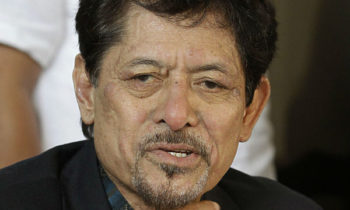 Abu Sayyaf extremists on Saturday freed a Norwegian man kidnapped a year ago in the southern Philippines along with two Canadians who were later beheaded and a Filipino woman who has been released by the ransom-seeking militants, officials said.
Abu Sayyaf extremists on Saturday freed a Norwegian man kidnapped a year ago in the southern Philippines along with two Canadians who were later beheaded and a Filipino woman who has been released by the ransom-seeking militants, officials said.
Kjartan Sekkingstad was freed in Patikul town in Sulu province and was eventually secured by rebels from the larger Moro National Liberation Front, which has a signed a peace deal with the government and helped negotiate his release, officials said.
Sekkingstad, held in jungle captivity since being kidnapped last September, was to stay overnight at the house of Moro National Liberation Front chairman Nur Misuari in Sulu and then meet with Philippine President Rodrigo Duterte on Sunday, said Jesus Dureza, who advises Duterte on peace talks with insurgent groups.
Dureza said that when he spoke on the phone with Sekkingstad, the Norwegian expressed his gratitude to Duterte.
A plan to fly Sekkingstad out of Sulu, a jungle-clad Muslim region about 950 kilometers (590 miles) south of Manila, was canceled Saturday because of bad weather, Dureza said.
It was not immediately clear whether Sekkingstad had been ransomed off. Duterte suggested in a news conference last month that 50 million pesos ($1 million) had been paid to the militants, but that they continued to hold on to him. The military said Saturday that relentless assaults forced the extremists to release the hostage.
“Under the intense pressure of focused military operations, the terrorist kidnap-for-ransom Abu Sayyaf group was constrained to release Sekkingstad as holding him under custody slows down their continues movement,” military spokesman Col. Edgard Arevalo said.
The hostage release comes just days after Duterte said he wanted US special forces to pull out of the southern Philippines, as The Christian Science Monitor reported.
In a speech on Monday, the Duterte said that the US troops would only complicate the fight against Abu Sayyaf.
“The US Special Forces, they have to go. They have to go in Mindanao,” said Duterte, according to United Press International (UPI). “If they [terrorists] see an American, they would kill him. They would demand ransom, then kill him.”
But US officials said they have received no official request to remover their military advisors from the area.
Military chief Gen. Ricardo Visaya warned the militants to release their other captives, including a Dutch birdwatcher and Indonesian and Malaysian tugboat crewmen, “or suffer annihilation.”
The BBC reports that Abu Sayyaf’s “hostages tend to be released if the ransom demanded for them is paid. This has been the outcome for most of their hostages. The group is known to kill captives if its demands are not met.”
Sekkingstad was kidnapped Sept. 21, 2015, with Canadians John Ridsdel and Robert Hall and Hall’s Filipino girlfriend, Marites Flor, from a marina on southern Samal Island, sparking a massive land and sea search by Philippine forces.
The Abu Sayyaf demanded a huge ransom for the release of the foreigners and released videos in which they threatened the captives in a lush jungle clearing where they displayed Islamic State group-style black flags.
Ridsdel was beheaded in April and Hall was decapitated in June after ransom deadlines lapsed. When Flor was freed in June, she recounted in horror how the militants rejoiced while watching the beheadings.
“It’s so painful because I saw them moments before they got beheaded,” Flor told reporters in June in southern Davao city, where she was flown to meet then President-elect Duterte.
“They were watching it and they were happy,” she said of the militants, adding that she did not witness the killings.
Government forces launched a major offensive against the militants after the beheadings of the Canadians sparked condemnations from then-Philippine President Benigno Aquino III and Canadian Prime Minister Justin Trudeau, who called on other nations not to pay ransoms if their citizens are abducted to discourage the brutal militants from carrying out more kidnappings.
The Abu Sayyaf has been blacklisted as a terrorist organization by the U.S. and the Philippines for deadly bombings, kidnappings and beheadings. Without any known foreign funding, the extremists have relied on ransom kidnappings, extortion and other acts of banditry, and some commanders have pledged loyalty to the Islamic State group partly in the hope of obtaining funds.
(csmonitor)
